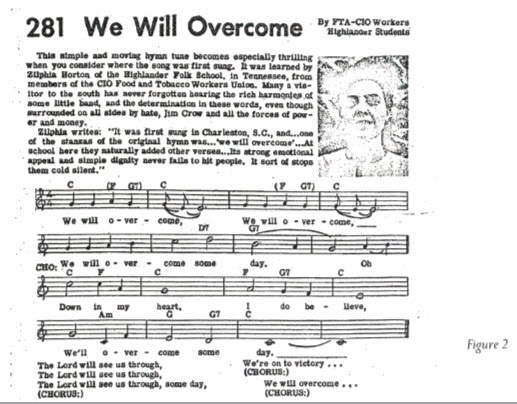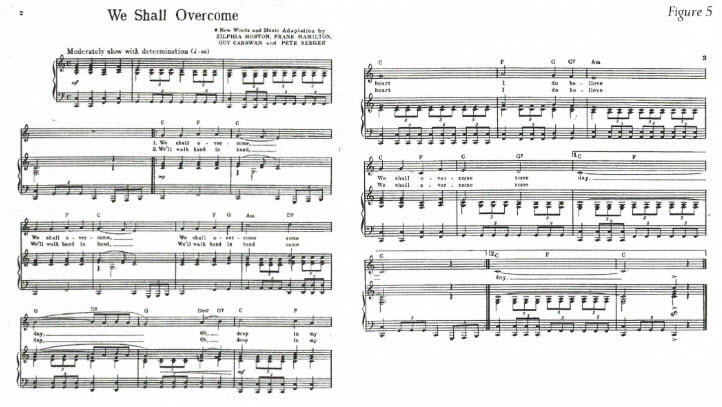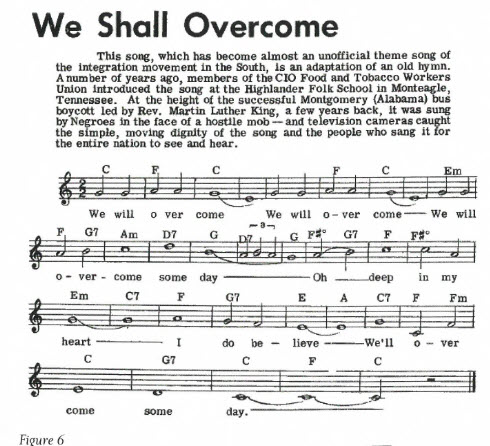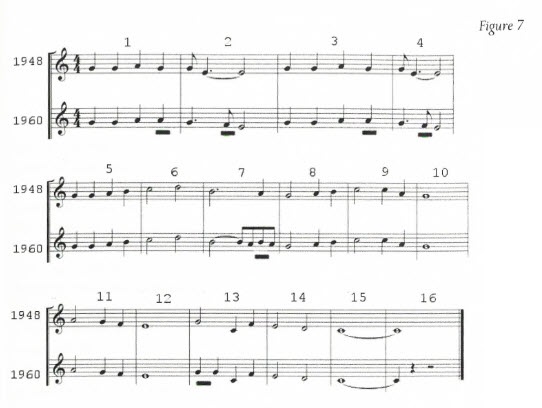“We Shall Overcome” Could Not Overcome the Public Domain
Sept/Oct 2019 – The DramatistThe late Pete Seeger’s iconic civil rights song “We Shall Overcome” was thrust into the copyright limelight in 2017 when a New York federal court ruled that the original 1948 copyrighted version of the sheet music (with lyrics), which was owned by Seeger’s company, People’s Songs, Inc., had fallen into the public domain in 1976, thereby ending all copyright protection.1
Butler Films and We Shall Overcome Foundation, the producers of a documentary film about the history of the song, wanted to use part of the song in their film, but had been refused permission by music publishers The Richmond Organization, Inc. and Ludlow Music, Inc., who professed to own a valid copyright in the song that had been first registered in 1960. When the publishers sought a license fee of $100,000, the producers struck back, asking the court to rule that the copyright in the song had expired and that later derivative versions of the song were not sufficiently original as to warrant their own viable copyright protection. The music publishers were unable to establish that later versions of the song registered in 1960 and 1963 were derivative works of the original that were still protected by copyrights.
The court’s decision teaches an excellent lesson in song provenance and the type of deep research that often is required to clear rights for film and theatrical productions, especially those tied to historical events and documentary productions. The opinion goes through a detailed, lengthy history of the song’s fascinating genesis, which likely originated with an old spiritual hymn that Zilphia Horton, a musician and folklorest educator, learned from striking tobacco workers in South Carolina in the early 1940s. The original spiritual hymn, “I’ll Overcome Some Day,” has been credited to Charles Albert Tindley and was registered with the Copyright Office in 1900.2
Horton rewrote the song into a secular civil rights song, and a version of it was published in the Highlander Folk School songbook in 1948. Here’s the beginning of the Highlander published version of “We Will Overcome,” which is now in the public domain (from the court’s opinion) [see figure 1 below].

In 1948, People’s Songs, Inc. (“PSI”) published “We Will Overcome” in a People’s Songs magazine, which contained a copyright notice and listed Pete Seeger as PSI’s Chairman and Board member. PSI registered the copyright in September 1948 (the “PSI Version”), but it expired in 1976 without being renewed; it thus entered the public domain. Here’s the music for the PSI Version (from the court’s opinion) [see figure 2 below].

The melodies of the Highlander Folk School and PSI versions are identical, except the PSI version added lettered chords above the musical staff. The lyrics of the one-verse Highlander version and the first and last verses of the PSI version are identical.
Three other versions of the song were released in 1952 (Hootenanny Records), 1959 (Cherry Lane Music) and 1960 (Sign Out Lyrics). As the court described, “each release uses ‘shall’ instead of ‘will’ and ‘deep’ instead of ‘down,’ although the first two use the contraction ‘we’ll’ in the thirteenth measure, rather than “we shall.” Cherry Lane registered a copyright in 1959 for a collection of songs, entitled Music For The 1st Five (5) Books Of Moses, described as “An arrangement and adaptation of various negro spirituals, to be used in conjunction with the 1st five books of Moses, from the Holy Bible.” One of the works in this 1959 collection was sheet music for a version of “We Shall Overcome” as arranged by Bob Corman. That sheet music, as registered, appeared as follows (from the court’s opinion) [see figure 3 below].

In 1960, defendant Ludlow Music, Inc. registered a copyright in the sheet music for a claimed derivative version of the song, listing Horton as a co-author with two others (but not Seeger). Ludlow’s agent described the new material added to the 1960 “derivative” version as follows: “Original registration under title I’LL OVERCOME. Melody has been changed. Harmonization wholly original. Verses two, three, four of lead sheet attached all original.” This was the Copyright Office deposit copy for that 1960 version (from the court’s opinion) [see figure 4, below].

In 1963, Ludlow obtained a second registration that identified Seeger, along with Horton and the others, as the authors of “New words and music adaption.”
Meanwhile, in 1960, Seeger’s magazine, Sing Out! The Folk Song Magazine, owned by Sing Out, Inc., had published lyrics identical to those in the song’s verse but without the music.
Sing Sing Out, Inc. registered a copyright for the magazine volume as a collective work, but there was no separate registration for the lyrics, which did not contain a copyright notice. These are the iconic first verse lyrics, as published in 1960 by Sing Out and long associated with Seeger—they are identical to the lyrics in the Ludlow Music sheet music registration:
We shall overcome,
We shall overcome,
We shall overcome some day;
Oh, deep in my heart,
I do believe,
We shall overcome some day.
According to Seeger, he learned a version of the song from Horton in 1946 when she came to New York City. In a 1963 tape recording submitted to the court, Seeger discussed various the ways in which he, Horton, two other writers (Carawan and Hamilton), and Southern communities had sung the song and their respective contributions to the song. Seeger regretted that the original writers from whom Horton had learnt the song had never been credited.
Seeger then corrected the lead sheet that had been filed by Ludlow Music for the 1960 copyright registration. The corrections included certain melodic additions that had become popular over time, along the verses that were not in the two 1960 lead sheet. Ludlow Music's 1963 registration included Seeger’s additions for the derivative work entitled “We Shall Overcome.” The 1963 registered sheet music for the first verse out of five, where the first and fifth verses were identical, appeared as follows (from the court’s opinion) [see figure 5 below].

Apart from very minor variations in notation, the sheet music for the 1960 and 1963 versions were identical. Seeger, Carawan and Hamilton had also signed a songwriters’ agreement and had decided to register the copyright in 1963 to prevent “Hollywood types,” using Seeger’s words, from coming out with a version “like ‘Come on Baby, We Shall overcome tonight.”
In 1994, Seeger asked Ludlow Music to legally remove his name from the song copyright, as he felt it was no longer necessary to protect the song, with Carawan and Hamilton being the arrangers and adapters of it. Ludlow Music never removed his name, apparently out of concerns over the impact it might have.
In the spring of 1961, Sing Out! magazine published sheet music with lyrics for five verses of the song (the “Sing Out Version”), describing it as “an adaptation of an old hymn” that had been introduced by union workers to the Highlander Folk School. Here’s the Sing Out! Version (from the court’s opinion) [see figure 6 below].

The Plaintiffs in the case asserted that the defendants dedicated the song to the public domain following Ludlow Music’s 1960 copyright registration. They pointed to the 1961 Sing Out Version being identical to the public domain 1948 PSI Version, except for use of the word “down” instead of “deep.” The defendants, in turn, argued there were four differences between the PSI Version and their 1960 registered version (the “Copyrighted Song”) that make it a derivative work.
A “derivative work” under the Copyright Act is one that is lawfully based on, or derived from, a prior work to which original, new creative elements have been added, such that the resulting derivative work is entitled to its own copyright protection as to the newly added elements. To the extent any portion of a derivative work are in the public domain, only the newly added elements survive; a derivative work cannot restore protection for a work that has entered the public domain.
The defendants pointed to the following differences between the Copyrighted Song and PSI Version: use of “will” versus “shall” (first and third measures); “we’ll” versus “we shall” (thirteenth measure); and “down” versus “deep” (ninth measure). They also argued there were differences in the sheet music versions, leading the court to make this comparison [see figure 7 below].

Not helping the defendants, however, was a prior opinion of an expert they themselves had retained in connection with an earlier copyright challenge to the Copyrighted Song, where their expert concluded that the Copyrighted Song was virtually identical to the PSI Version.
While a Certificate of Copyright Registration normally provides the copyright owner with an initial presumption that the underlying copyright is valid, in this case the court rejected any presumptions of validity respecting the 1960 and 1963 copyright registrations because of erroneous information submitted to The Copyright Office about the derivative nature and authorship of those works.
Judge Cote agreed with the plaintiffs “that the lyrics and melody in the first verse and its identical fifth verse ('Verse 1/5’) of the Song are of sufficiently original to qualify for copyright registration as a derivative Fork.” The court found only minor differences between the 1948 public domain PSI sheet music version and the later versions registered in 1960 and 1963. Specifically, the words [will overcome” were changed to shall overcome” and the phrase down in my heart” was changed to deep in my heart.” Two small music ranges were also noted, described judge Cote as follows:
In both versions of the Song the differences occur during the melodic descent note “A” to “E” during the singing of word “overcome.” Specifically, the descent from “A” to “E” begins one beat later in the Copyrighted Song, and an eighth note “F” is added between notes “G” and “E” in the second measure. This also changes the rhythm of the second measure. The second difference appears in the seventh measure. In both versions, the melodic descent is from note “D” to “G” during the singing of the word “someday,” which is sung over measures six to eight. The Copyrighted Song adds a flourish or trill during this descent, while the word “day” is being sung. The trill consists of three eighth notes “A - B - A.”
As a matter of law, the alterations from the PSI Version were found to be too trivial. A person listening to Verse 1/5 of the Song, noted the court, would be hearing the same old song, which was reflected in the published PSI Version, with only minor, trivial changes of the kind that any skilled musician would feel free to make. As the Copyright Act teaches, any judgment about modifications to an original work must be based on a consideration of the later derivative work “as a whole.”
There was no question that the 1948 PSI Version was in the public domain, because the copyright expired in 1976 without being renewed. As the court noted, a derivative work “is one that is ‘substantially copied from a prior work” such “that it would infringe the prior work unless the copyright owner had given consent or the copied work was in the public domain.”
Section 101 of the Copyright Act provides examples of common types of derivative works that are based one or more preexisting works, including a “translation, musical arrangement, dramatization, fictionalization, motion picture version, sound recording, art reproduction, abridgment, condensation, or any other form in which a work may be recast, transformed, or adapted.” Under Section 103 (b) of the Act, the copyright in a derivative work only extends to the newly contributed content and is “independent of, and does not affect or enlarge the scope, duration, ownership, or subsistence of, any copyright protection in the preexisting material.”
In order for later additions to qualify as a separately protectable derivative work, the additions must be independently copyrightable and, as the court emphasized, “‘contain some substantial, not merely trivial originality.” Caution is needed when analyzing originality so as not to over-empower the creator of a first derivative work who might then “interfere with the creation of subsequent derivative works from the same underlying work.” With this in mind, for a musical work to constitute a valid derivative work, “something of substance” that qualifies for copyright protection must be added to the old song. Examples of additions lacking such substance have been noted by the Copyright Office as including “1) The change of a few notes in the melody of ‘The Star Spangled Banner’; 2) Mere transposition of an old song into a different key; 3) The omission of two measures from an old song.” Similarly, “common phrases lack originality and are not eligible for copyright protection.”
Applying these principles, the court held that “the melody and lyrics of Verse 1/5 of the Song are not sufficiently original to qualify as a derivative work entitled to a copyright.” Apart from an average listener not discerning any difference in Verse 1/5, other than “minor, trivial changes of the kind that any skilled musician would feel free to make,” the court also held that “the changes of ‘will’ to ‘shall’ and ‘down’ to ‘deep’ and the melodic differences in the opening measures and the seventh measure, do not create a distinguishable variation. These differences represent “variations of the piece that are standard fare in the music trade by any competent musician.”
The music publisher defendants argued that changing “will” to “shall” “was transformative because the two words have different meanings.” They argued that “in the context of the first person (‘I’ and ‘we’), ‘shall’ is used to form the simple future tense, while ‘will’ is used to express a strong determination to do something.” The publishers also asserted “that the word ‘shall’ carries a sense of solemnity that is absent from the word ‘will’ and is better fitted to the peaceful, non-violent Civil Rights Movement that adopted the Song.” This was rejected out of hand by the court: “This single word substitution is quintessentially trivial and does not raise a question of fact requiring a trial to assess whether it is more than trivial. The words will and shall are both common words. Neither is unusual. Grammatically, both words perform similar functions in a phrase or sentence, as they were here. They can be readily substituted in a sentence.”
Similarly, the musical additions or changes were also deemed trivial by the court: “There is no change to the overall melody of Verse 1/5. Two utterly trivial differences appear. In each instance, the difference occurs during a melodic descent. The starting note and ending note in that descent are the same. In one instance, the descent begins one beat later, and an eighth note (an “F”) is added. In the other, a trill is added.”
Despite arguments that the defendant’s versions of the song became a veritable Civil Rights Movement national anthem in the 1960s, the court emphasized that “the fact that a trivial change to the lyrics became a part of a popular version of a song does not render that change nontrivial and automatically qualify the popular version for copyright protection. Popularity does not equate with originality.” And while the defendant publishers expressed their virtuous intentions to keep the song from being exploited commercially, the court said that principles “of copyright protection for derivative works apply equally whether the original work is humble or distinguished and whether it is noble or quite the opposite. The gap in the proof of originality cannot be filled by good intentions.”
As a result, the court held that the defendant publisher had “no valid copyright in the words and melody of the first verse of ‘We Shall Overcome’ because it lacks originality.” Although this left other claims in the case still actionable for a trial, including a claim that the publishers had obtained their copyright registrations by fraud. Prior to trial the parties entered into a settlement agreement, which provided that the defendant publishers would not “claim copyright in the melody or lyrics of any verse of the song ‘We Shall Overcome’ and that the verses of the song were “hereafter dedicated to the public domain.”
Postscript: In July 2018, the federal court awarded the plaintiffs $352,000 in legal fees, plus expenses, under a provision of the Copyright Act that permits a court, in its discretion, to make an award of attorneys’ fees to the prevailing party.3 The court characterized the plaintiff’s action as having provided an “inestimable benefit” to the public by preserving “We Shall Overcome”—an “iconic anthem of the American Civil Rights Movement”—for the public domain.
This was all a gutsy move on the part of the documentary film producers, who clearly had researched the provenance of the song and its copyright history (which is publicly accessible for research purposes) and likely felt very strong about their legal position. Whether or not the motives of the music publishers were virtuous, it is not the first time that copyright has been used as an economic sword to extract license payments over dubious claims. The high cost of litigation will most often dissuade a potential licensee from bringing a court challenge, and film and theatrical producers may end up paying for rights rather than litigating if the underlying work is critical to the story. In 2016, Warner Music Group threw in the towel following years of lucrative licensing of the popular “Happy Birthday To You” ditty, after another federal court found in late 2015 that the song was in the public domain.4 Warner then settled the case by agreeing to pay $14 million to “thousands of people and entities” who previously had paid licensing fees.
So the lesson is to do your homework as to both copyright ownership and copyright validity if you must use historical source materials in a dramatic work. Having the economic backing to undertake that investigation and engage in potential litigation is, of course, essential. But if the research reveals a strong position, that can be leveraged to perhaps negotiate an inexpensive license, because the purported rights owner may shy away from a court challenge that would prove disastrous should they lose.
Barry Werbin is counsel at Herrick, Feinstein LLP where he heads the firm’s intellectual property and technology practices. Barry was prior Chair of the NYC Bar Association’s Copyright Committee, and Co-Chair of the Copyright Society’s NY Chapter.
1. We Shall Overcome Foundation v. The Richmond Organization, Inc., 2017 WL 3981311 (S.D.N.Y. Sept. 8, 2017).
2. https://en.wikipedia.org/wiki/We_Shall_Overcome.
3. We Shall Overcome Foundation v. The Richmond Org., 330 F. Supp. 3d 960 (S.D.N.Y. 2018).
4. Marva v. Warner/Chappell Music, Inc., 131 F. Supp. 3d 975 (C.D. Cal. 2015).
This article originally appeared in the Sept/Oct 2019 edition of The Journal of the Dramatists Guild of America, Inc.'s The Dramatist.
